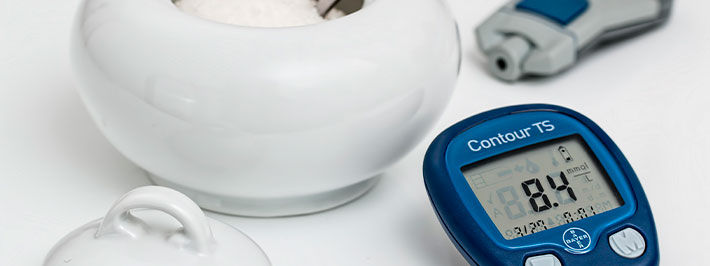
Why does Covid-19 increase the risk of diabetes in some people?
Recent studies show that coronavirus infection can reveal type 2 diabetes or, more rarely, type 1 diabetes. By what mechanisms?.
Scientists have drawn attention in recent months to the risk of developing diabetes after Sars-Cov2 infection. Published on March 21, 2022, a US study involving 200,000 people shows that diabetes is a possible sequel to infection.
Another research work, carried out by a German team and published in the journal Diabetologia on March 16, 2022, compares two groups of patients after their consultation with a general practitioner: the first infected with Covid, the second with a respiratory infection due to a virus other than the coronavirus. Results: the risk of type 2 diabetes is increased by 28% in the first group compared to the second.
These results challenge the diabetes community. For Professor Eric Renard, vice president of the French-speaking Diabetes Society, two situations must be distinguished: on the one hand, type 2 diabetes that occurs without real surprise in predisposed patients, on the other, the most unexpected cases of type 2 diabetes 1 in children, adolescents, or sometimes adults.
The vast majority of diabetes cases that appeared after Covid are "type 2".
What is type 2 diabetes?
This disease usually occurs around the age of 50, in people who are overweight and sedentary, or who have a family history. Gradually, your blood sugar level ( glycemia ) begins to rise. Your body is resistant to insulin, the hormone responsible for regulating blood sugar levels throughout the day. In these people, the beta cells that secrete insulin in the pancreas are not destroyed. They continue to work, but with limitations.
This type 2 diabetes evolves without symptoms. Only blood glucose tests can reveal it. The person begins by developing prediabetes , characterized by repeatedly measured fasting blood sugar levels between 1 and 1.25 grams per liter (g/l).
What happens during a Sars-Cov2 infection?
The virus penetrates the body and, in particular, the beta cells of the pancreas. This infection triggers an inflammatory reaction which, in turn, induces insulin resistance. As a result, blood sugar rises.
In people whose pancreas is healthy, insulin secretion increases to overcome the phenomenon of resistance and blood sugar remains normal, but in those whose pancreas has limited adaptive capabilities, even moderate Covid can lead to diabetes. type 2.
Pr Renard: "Many of the patients in question had prediabetes or unknowingly started diabetes. The inflammatory reaction due to coronavirus infection has created insulin resistance in people whose pancreas was already failing."
In the most severe cases, the inflammatory reaction is so violent that it causes very significant hyperglycemia. Then the patient must administer insulin. Most of the time, this treatment is temporary. When the blood sugar level is back under control and the infection is cured, the patient returns to the usual management of type 2 diabetes: weight loss, balanced diet, regular physical activity and, if necessary, prescription of different medications to insulin.
In contrast, in long Covid, when the inflammation persists for several months, insulin injections must be continued for as long as necessary.
More rarely, Covid-19 can reveal type 1 diabetes
In much rarer cases, mainly affecting children, adolescents, or young adults, coronavirus infection reveals type 1 diabetes when these patients apparently had no risk factors.
What is type 1 diabetes?
In this form of the disease, the beta cells of the pancreas are irreversibly destroyed by the body's own defenses (which is why it is called an autoimmune disease) and no longer produce insulin. To control their blood glucose, the patient must benefit from daily insulin supplies, either by self-injection or by pump.
What happens after a Sars-Cov2 infection?
The mechanism is less clear than for type 2 diabetes occurring after Covid. However, one hypothesis prevails: "The coronavirus would modify the beta cells after having infected them, which could trigger an autoimmune reaction in predisposed subjects. In this case, the patient's body destroys its own cells because it considers them abnormal," explains the Professor Renard. The only possible treatment remains insulin, for life.
Should we screen for diabetes after Covid?
There's no need to rush a blood glucose test after an infectious episode. "A Covid alone is not enough to justify blood sugar control," says Professor Renard. This monitoring is justified, however, in people who have risk factors for diabetes (obesity, overweight, family history, etc.). In any case, they are recommended even outside the context of Covid.
The only real emergency is the appearance of symptoms suggestive of diabetes after Covid, such as very intense thirst or a frequent urge to urinate. In this case, rapid detection of diabetes is essential.
Therefore, the cases of diabetes that occurred during the Covid-19 pandemic did not surprise diabetologists. "What surprised us was the violence of the inflammatory reaction that causes a sudden increase in blood sugar," Professor Renard specifies anyway.